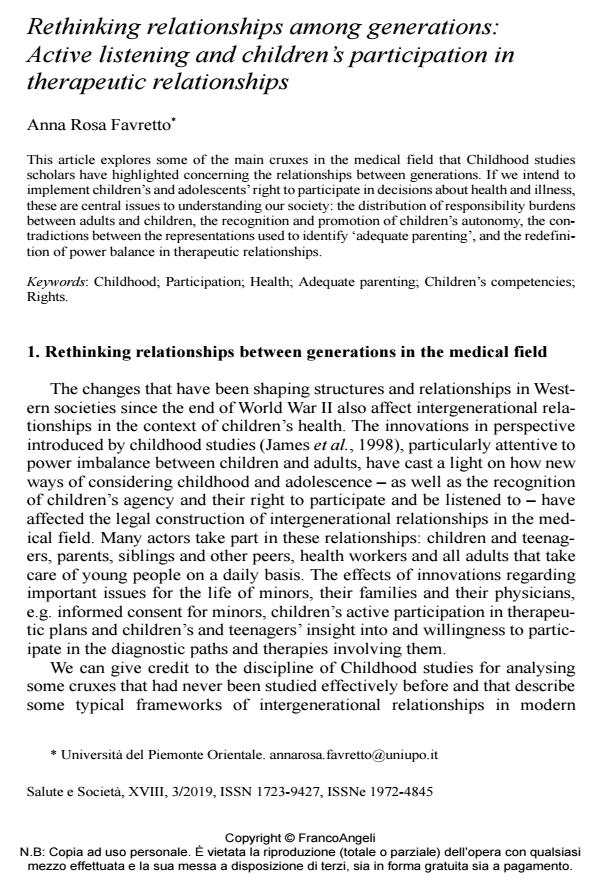Rethinking relationships among generations: Active listening and children’s participation in therapeutic relationships
Titolo Rivista SALUTE E SOCIETÀ
Autori/Curatori Anna Rosa Favretto
Anno di pubblicazione 2019 Fascicolo 2019/3 Lingua Inglese
Numero pagine 10 P. 49-58 Dimensione file 107 KB
DOI 10.3280/SES2019-003005
Il DOI è il codice a barre della proprietà intellettuale: per saperne di più
clicca qui
Qui sotto puoi vedere in anteprima la prima pagina di questo articolo.
Se questo articolo ti interessa, lo puoi acquistare (e scaricare in formato pdf) seguendo le facili indicazioni per acquistare il download credit. Acquista Download Credits per scaricare questo Articolo in formato PDF

FrancoAngeli è membro della Publishers International Linking Association, Inc (PILA)associazione indipendente e non profit per facilitare (attraverso i servizi tecnologici implementati da CrossRef.org) l’accesso degli studiosi ai contenuti digitali nelle pubblicazioni professionali e scientifiche
This article explores some of the main cruxes in the medical field that Childhood studies scholars have highlighted concerning the relationships between generations. If we intend to implement children’s and adolescents’ right to participate in decisions about health and illness, these are central issues to understanding our society: the distribution of responsibility burdens between adults and children, the recognition and promotion of children’s autonomy, the con-tradictions between the representations used to identify ‘adequate parenting’, and the redefini-tion of power balance in therapeutic relationships.
Keywords:Childhood; Participation; Health; Adequate parenting; Children’s competencies; Rights.
- Bath C. (2013). Conceptualising listening to young children as an ethic of care in early childhood education and care. Children & Society, 27(5): 361-371.
- Christensen P. (2000). Childhood and the cultural constitution of vulnerable bodies. In: Prout A., Campling J., editors, The body, childhood and society. Basingstoke: MacMillan.
- Corsaro W.A. (2003). We’re friends, right? Inside kids’ culture. Washington: Joseph Henry Press.
- Crocetta C. (2014). I diritti e l’autonomia decisionale del minore in ospedale. Bâle: Helbing Lichtenhahn, Università de Neuchâtel.
- Favretto A.R. (2017). I bambini e la salute: il diritto alla salute come diritto partecipato. In: Favretto A.R., Fucci S., Zaltron F., editors, Con gli occhi dei bambini. Come l’infanzia affronta la malattia. Bologna: il Mulino.
- Favretto A.R., Zaltron F. (2013). Mamma, non mi sento tanto bene. La salute e la malattia nei saperi e nelle pratiche infantili. Roma: Donzelli Editore.
- Fin C. (2016). I requisiti del consenso al trattamento medico. In: Quagliariello C., Fin C., editors, Il consenso informato in ambito medico. Bologna: il Mulino.
- Freeman M. (2005). Children’s health and children’s rights: An introduction. International Journal of Children’s Rights, 13: 1-10. DOI: 10.1163/157181805454516
- Hutchby I., Moran-Ellis J., editors (1998). Children and social competence. Arena of action. London-New York: Routledge.
- James A., Jenks C., Prout A. (1998). Theorizing childhood. Cambridge: Polity Press.
- Lee E., Bristow J., Faircloth C., Macvarish J. (2014). Parenting culture studies. Hampshire: Palgrave Macmillan.
- Lusardi R., Manghi S. (2013). I limiti del sapere tecnico: saperi sociali nella scena della cura. In: Vicarelli G., editor, Cura e salute. Prospettive sociologiche. Roma: Carocci.
- Mayall B. (1996). Children, health and social order. Buckingham: Open University Press.
- Mayall B. (2002). Towards a sociology for childhood: Thinking from children’s lives. Buckingham: Open University Press.
- Pierret J. (2003). The illness experiences: state of knowledge and perspective of research. Sociology of Health & Illness, 25(3): 4-22.
- Prout A. (2000). Childhood bodies: Construction, agency and hybridity. In: Prout A., Campling J., editors, The body, childhood and society. Basingstoke: MacMillan.
- Qvortrup J. (1995). From useful to useful: The historical continuity of children’s constructive participation. In: Ambert A.M., editor, Sociological Studies of Children. Greenwich, Connecticut: J.A.I. Press.
- Tobin J. (2006). Beyond the supermarket shelf: Using a rights based approach to address children’s healthy needs. International Journal of Children’s Rights, 14(3): 275-306. DOI: 10.1163/15718180677845810
- Turmel A. (2013). Une sociologie historique de l’enfance. Laval: Presses de l’Université Laval.
- Turri G.C. (2005). Autodeterminazione, trattamenti sanitari e minorenni. Minorigiustizia, 2: 125-146. DOI: 10.1400/7192
Anna Rosa Favretto, Rethinking relationships among generations: Active listening and children’s participation in therapeutic relationships in "SALUTE E SOCIETÀ" 3/2019, pp 49-58, DOI: 10.3280/SES2019-003005